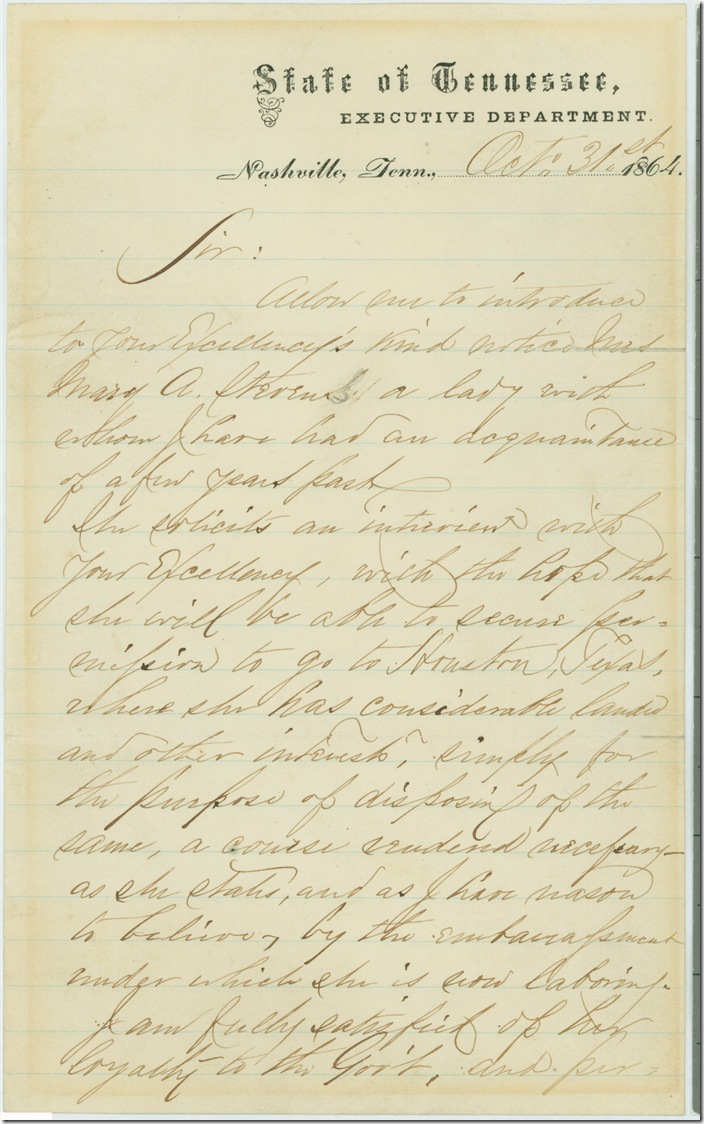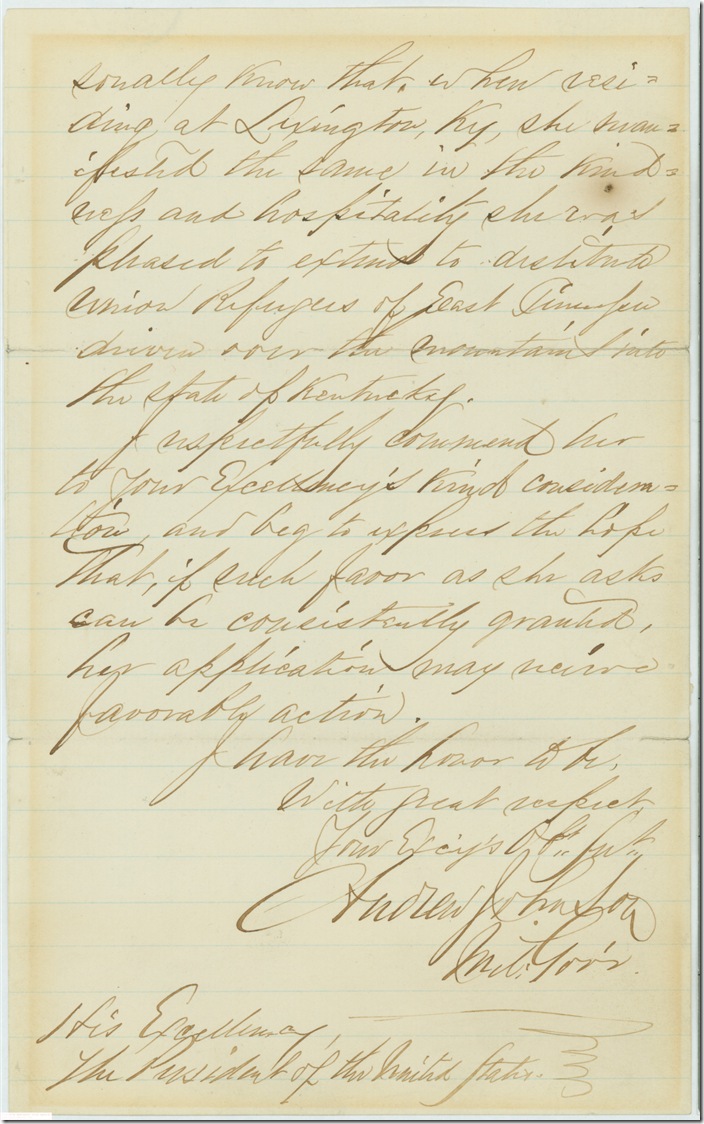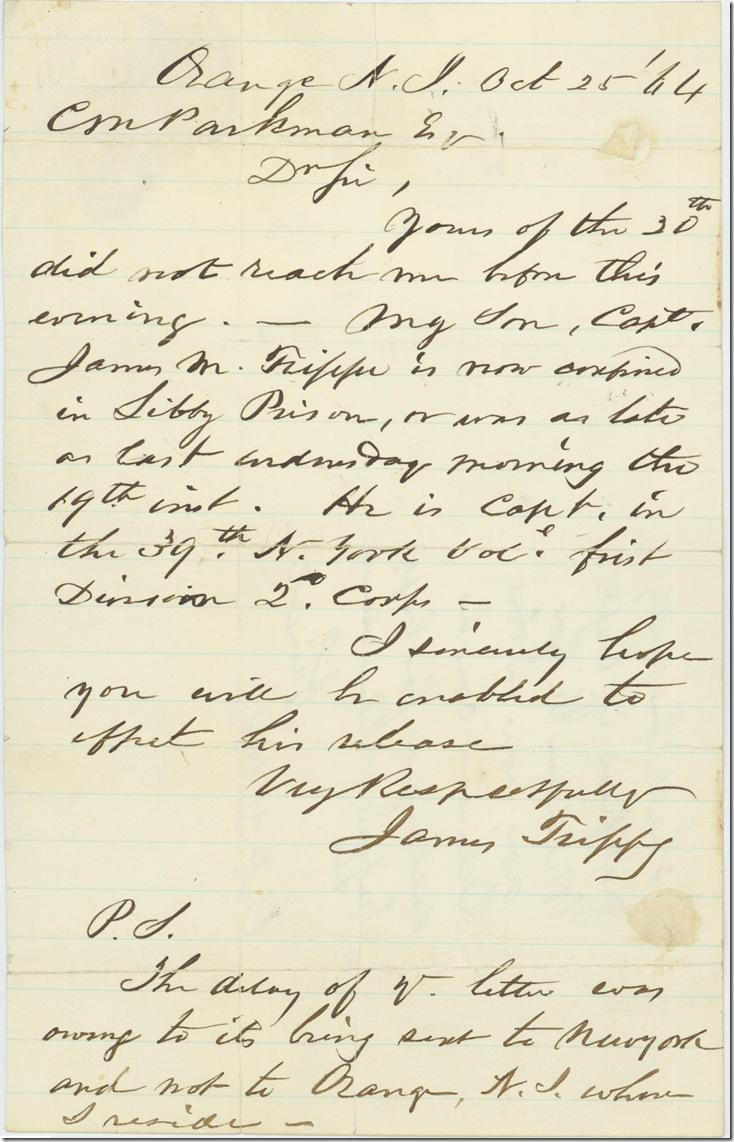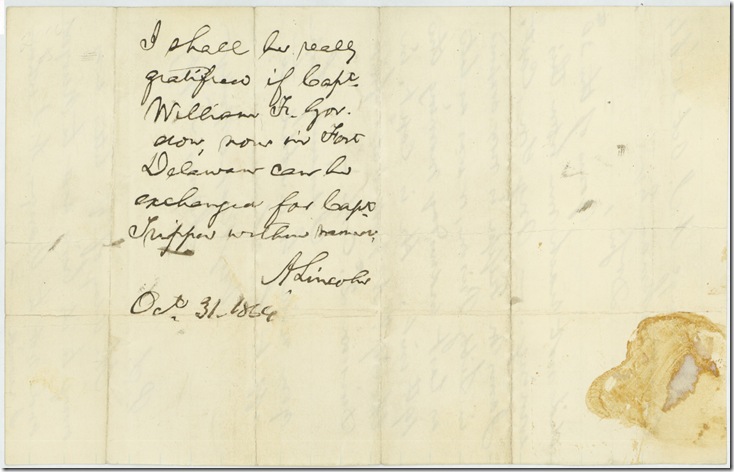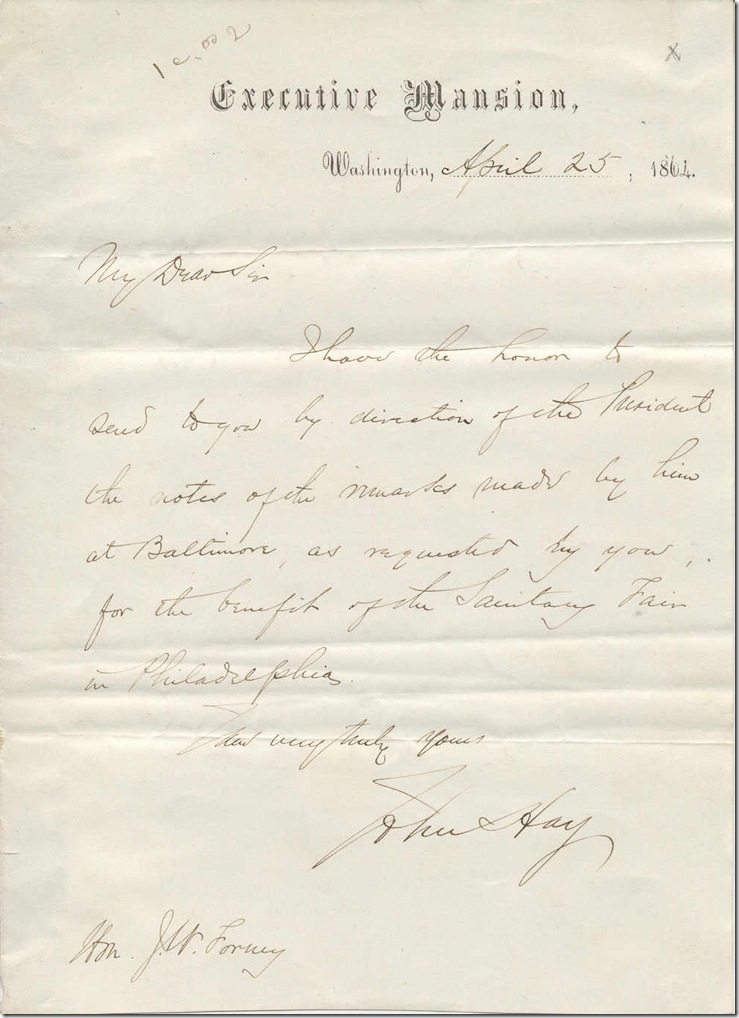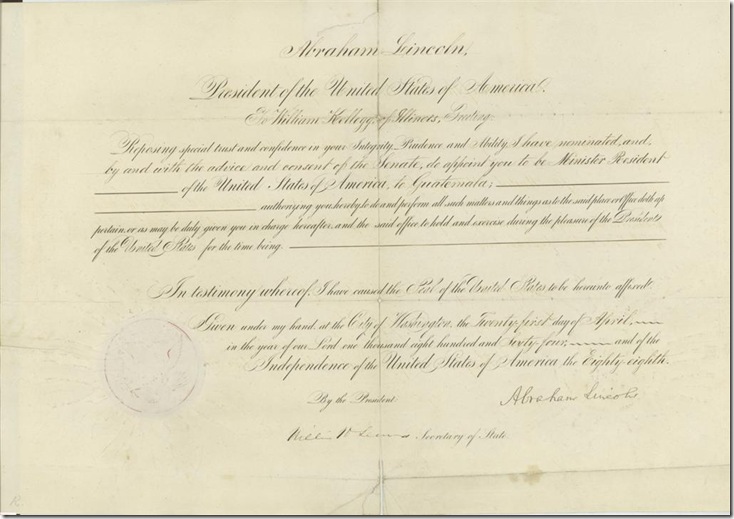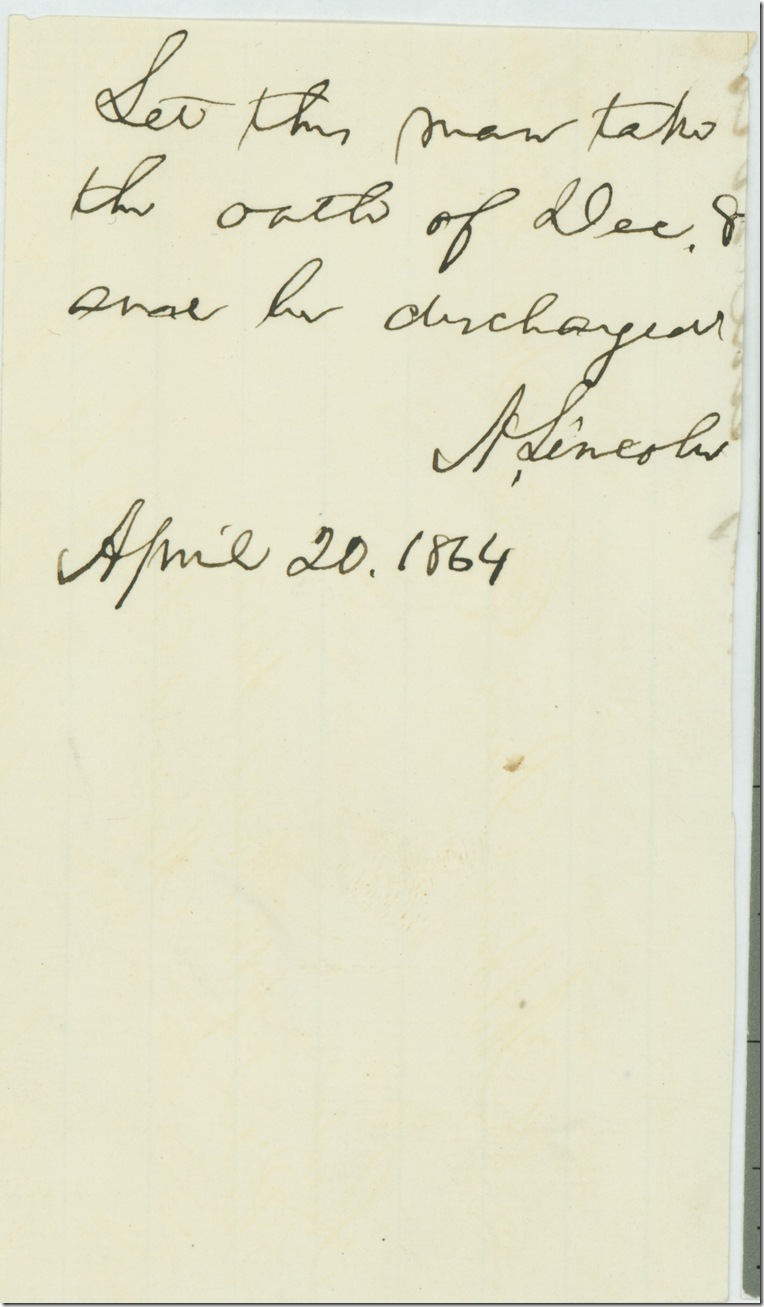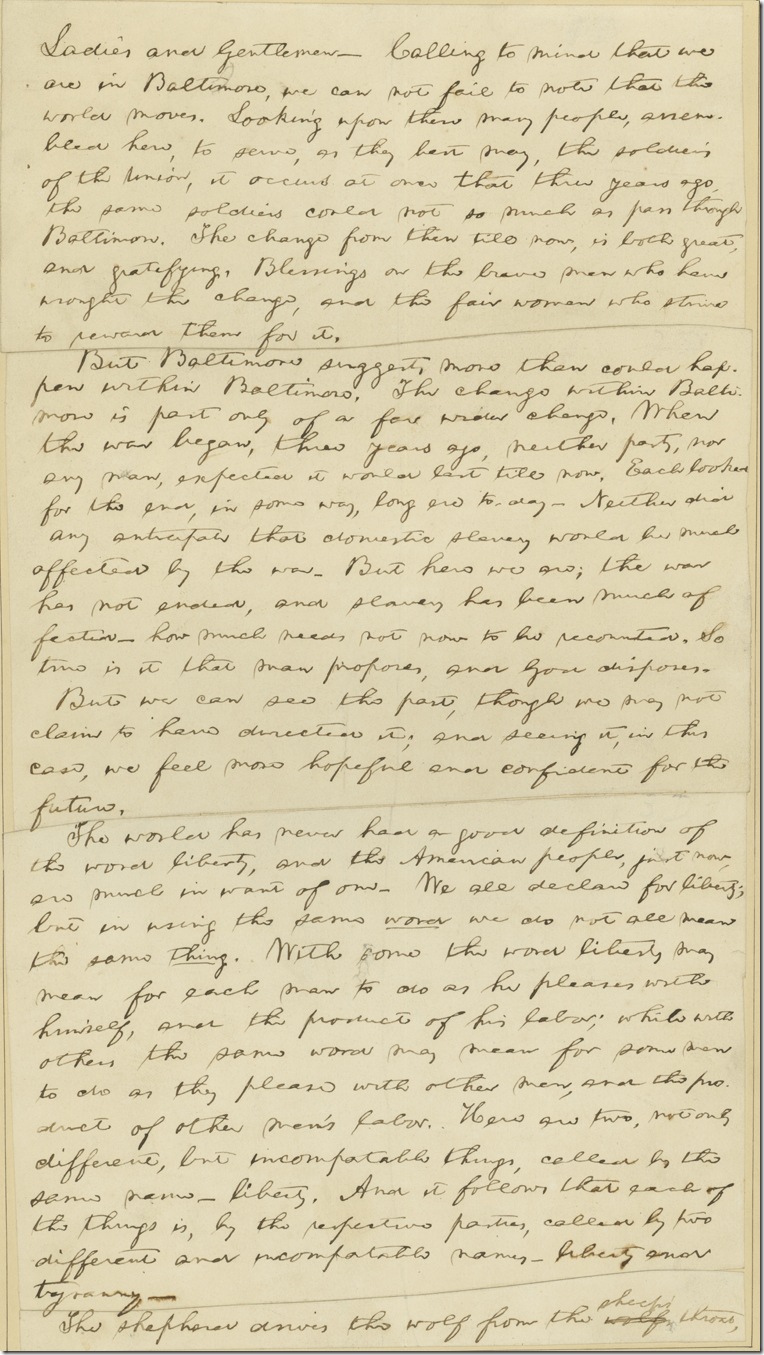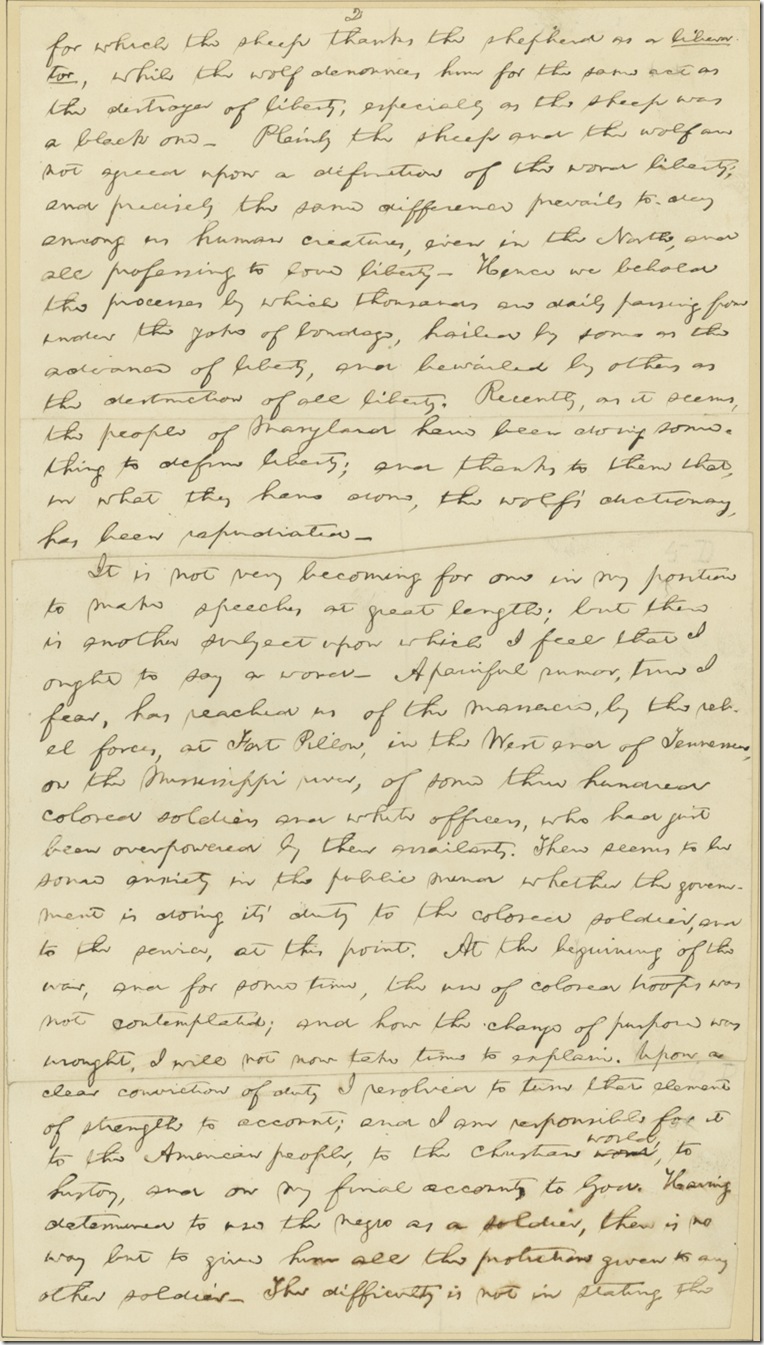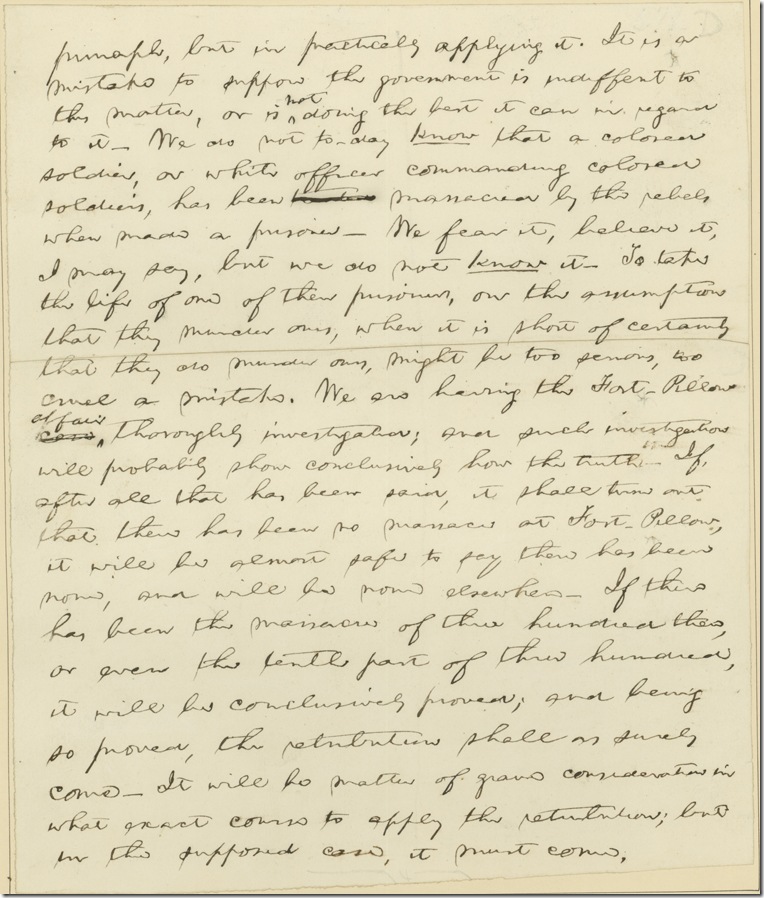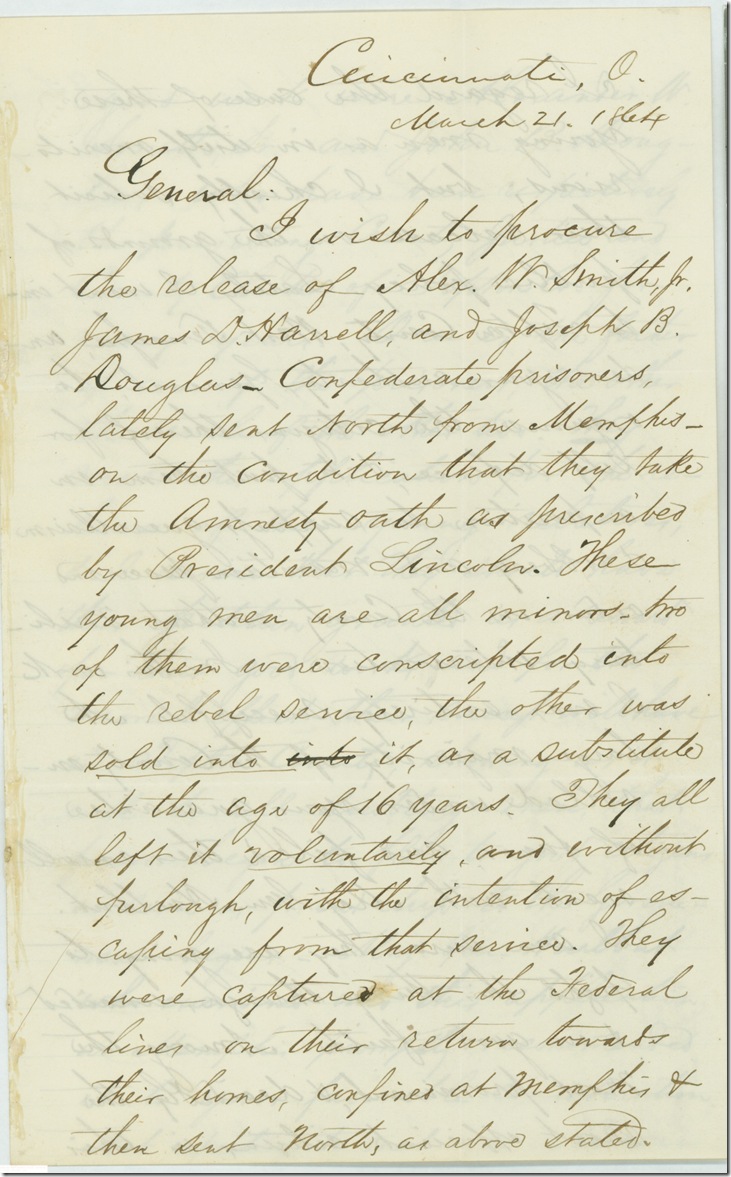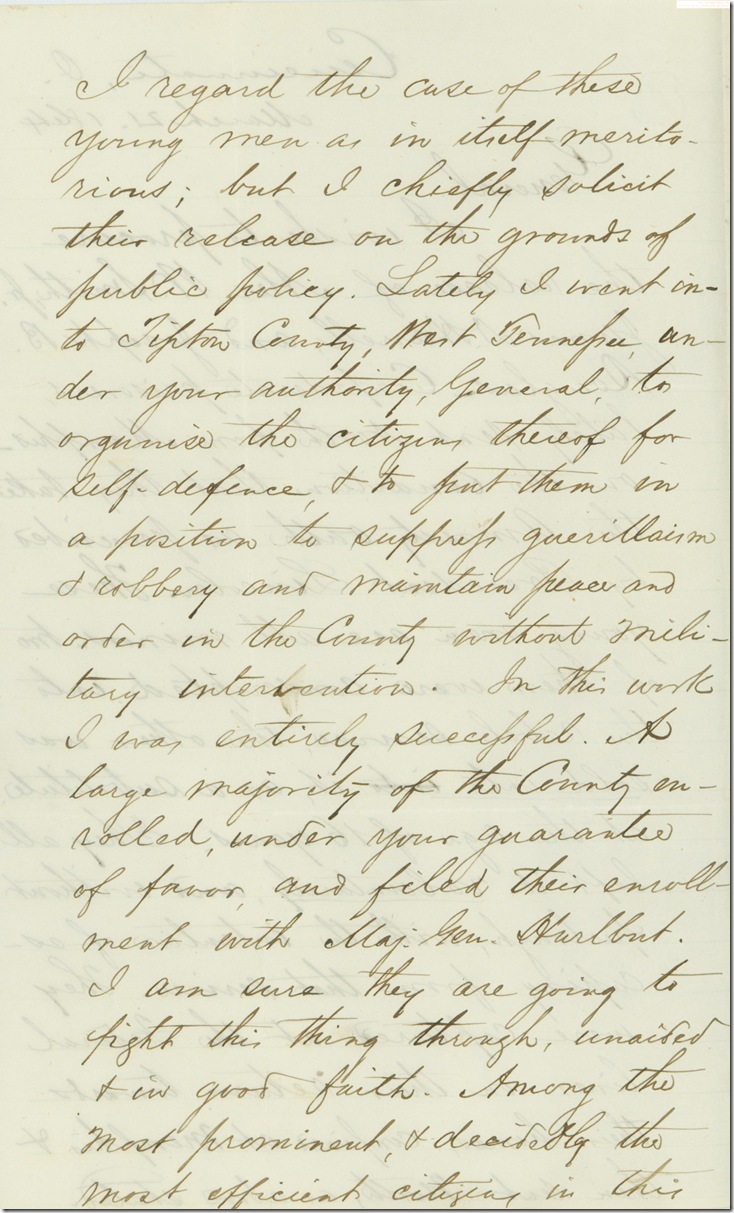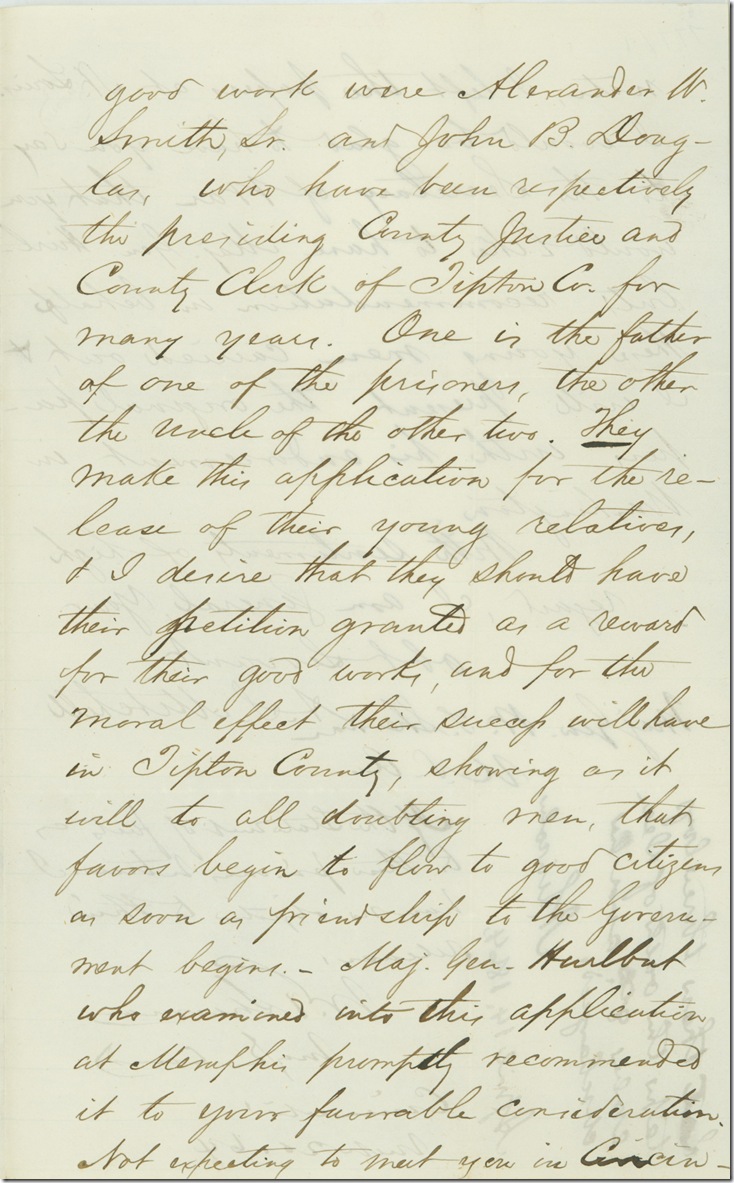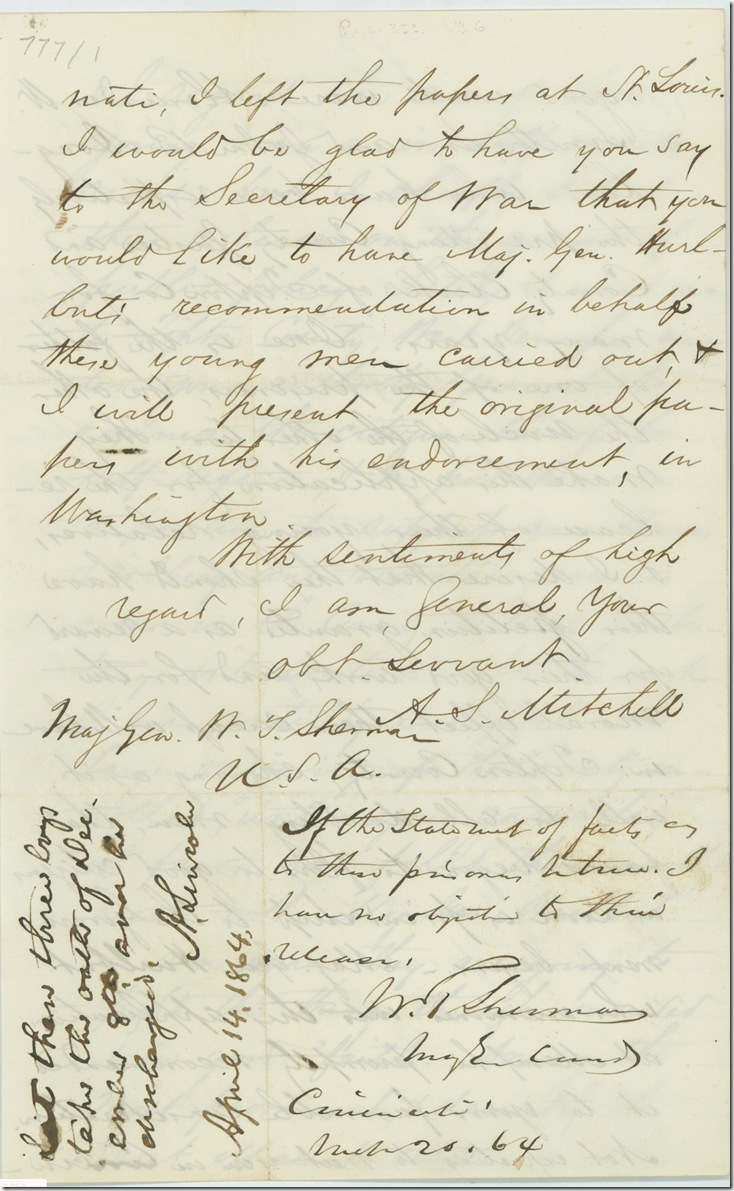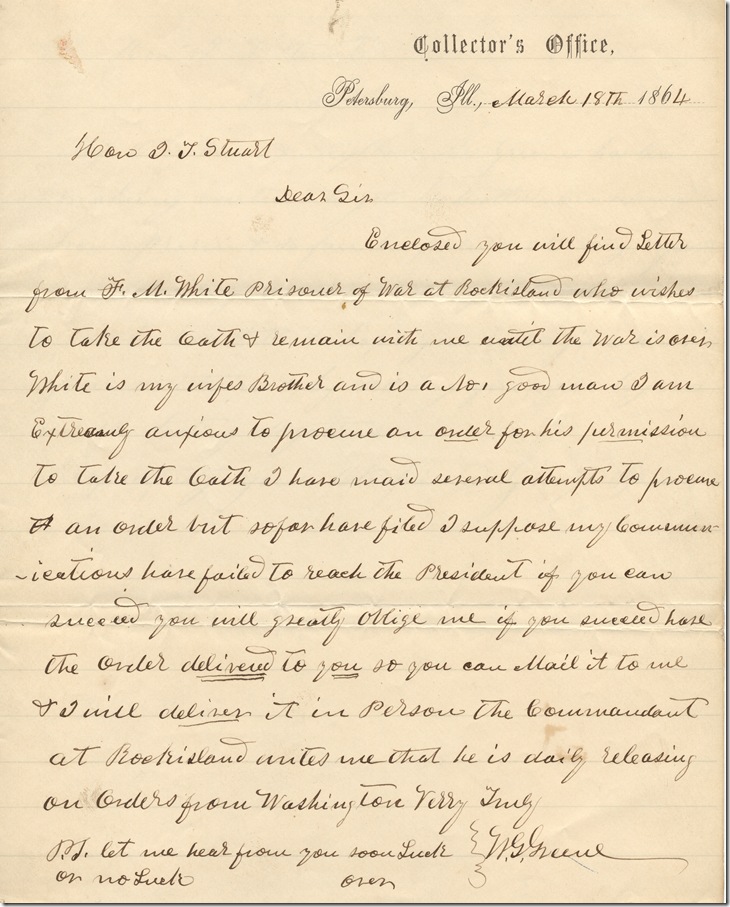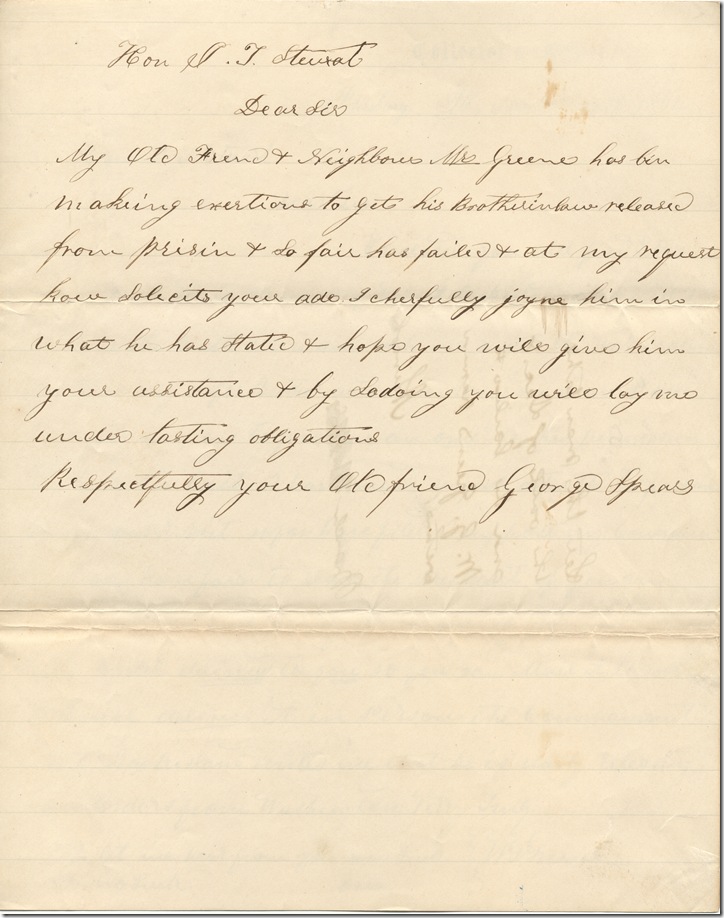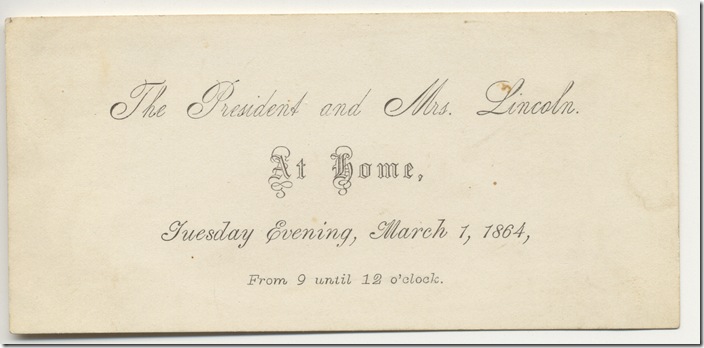







Transcription:
Washington June 9th, 1864
Excellent Sir,
Permit me a humble admirer of your Administration and a devoted partizan [sic] to the objects you design accomplishing for this Continent of Nations and the World to say a few words on the subject of our hasty interview yesterday.
I formed one of the visitors to whom you gave audience at the White House yesterday afternoon. And as it was the first time I enjoyed that honor, you knew me not. I entered your presence unheralded and unsupported by any known dignitary, believing that my mission was so transparently correct that I could not fail in accomplishing it. (It was to procure a pardon for James A . McCrea from the balance of the sentence in his case.) I did fail however, partly through the means I used, and partly through the hurry and confusion of so many diversified applications being made to Your Excellency at the same moment, and the Mass of more important matters pressing on your mid. I knew James A. McCrea before + long before he left New York for Beaufort and know that for Capacity as a Mechanic, for skill as a Machinist, he ahs few superiors, and I know that he is also possessed of great natural intellectual power, and high moral qualities.
These powers are all wanted in the conquered or reclaimed provinces of the south, and are the elements on which the Nation must depend to regenerate and affiliate the south to the Republic, when force of arms has done its work. And National Policy dictates courting such talent into those provinces instead of repelling and banishing it. But Mr. McCrea as I am informed and believe possesses another quality not common to Northern Men—That is a skill in raising and ginning cotton. This he acquired by a residence in the West Indies.
Once of the great problems to be solved, if not solved already, and demonstrated to this great people, over whose destinies you are now placed, and which you will undoubtedly control for a long period after peace will be restored, is whether free labor can produce the Southern staples as effectively as slave labor. In fact this great truth established in the minds of the people will become the basis of moral and mutual regeneration of the Republic.
To test this great question surely and speedily should be one of the first objects of a government aiming at the overthrow of slavery. And this thought existing in the mind of the Government has led to the adoption of the means now in operation for that purpose.
Mr. McCrea purchased one of the abandoned estates in Beaufort and was carrying it on and is anxious to carry it on, with hired paid labor, and was thus an unpaid agent in helping to prove to the republic + the world that the substration of your government policy is beneficent and sublime. For those reasons no man with capacities so requisite at this peculiar juncture of our Nation’s history should be unnecessarily banished from the field of his and our labors.
You will admit all I allege if you believe what I say in regard to McCrea’s capacities and designs. Now why should I not be believed in this respect? Because you do not know me. But I can make myself known to you through those that know me and who are known to you.
The petition I presented for McCrea’s pardon was signed by eleven of as good men as live and without any importunity from me, other than a simple request, and as my known veracity and attachment to every thing national and benevolent.
No public man ever needed to sign any paper to get rid of me, for I never request or seek any thing inconsistent with their dignity, or with what is right.
I humbly pray that you will regard their indorsement [sic] of the petition in no other light than as an introduction to your confidence in my integrity and earnestness of purpose.
I had a letter from Abram Wakeman Esq. Postmaster of New York a good + true man, and really deemed myself fully entitled to belief as to my representations.
But you say that Mr. McCrea was banished from the department upon the conviction of a Crime. The crime was selling a bottle of Whisky to a [illegible] engaged in the army which he did as a favor. And also delivering a barrel of Whisky to the Butcher of the Army, which had been left at his place for him.
It is not easy to convince a Scotch Man that these are criminal acts, they may become so at times and places, when ladies or men are called upon to act with cool heads and steady hands and feet and therefore the prohibition of Liquors in the army, as a Military regulation was eminently proper, and any disregard or violation of that rule, should be punished.
But the punishment should be regulated by the same rules, which controls all other class of offences, so that it would not defeat its own object, and injure the individual punished and the community of which he formed a part, and more severely than justice demands and mercy justifies.
The parties to whom the liquor was given in this case, were both engaged in occupations where Liquor has always been used as a conceived necessary stimulant, and I am informed that when they were prohibited form attaining it otherwise the government saw the necessity and admitted the propriety of supplying it to them.
Mr. McCrea as a matter of friendship to them, knowing their feeling on the subject, and not for profit to himself, gave a bottle out of his own family stack, + allowed the keg to be left and delivered as before stated.
He suffered a severe punishment in standing so many hours a day for a number of consecutive days in a disgracified position. He was ordered to pay + did pay a fine of $500, and he has suffered Banishment from his adopted home and household, with all its endearing interests thus long and my prayer simply is that the balance of his sentence be rescinded.
He will never violate any rule of the department again. He will give bonds if necessary so to do.
But you say you will not interfere on an exparte statement with the action of the Commission and with the duties of Governor Saxton.
This is right + proper and dignified. And I now simply and earnestly request that you would do this one thing through some one of your secretaries.
Request Governor Saxton if it be consistent with the safety of his department and the proper exercise of his powers to remit the balance of the sentence in this case.
He will then look into the case with a greater degree of care, and decide upon it with a more statesmanlike judgment than he otherwise might.
In the mean time we will follow your advice and endeavor to procure from him a consent to the nullification of the sentence. Fearing I might not enjoy another interview with your Excellency I have written this long argument and beg leave to subscribe myself.
Your humble servant,
James G. McAdam
For His Excellency
Abraham Lincoln
President
McCrea was banished from Beaufort by the Military authorities, & I am now called on to send him back, without the consent of those authorities, which I can not consent to do. They & not I must judge whether his presence is injurious. If the Gen. in command there—Gen. Saxton I believe—consents, then I am quite willing for Mr. McCrea to return—not without. A. LINCOLN
June 10, 1864.
Citation: James G. McAdam, autograph letter signed to Abraham Lincoln. 9 June 1864. AMs 527/13
